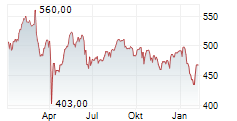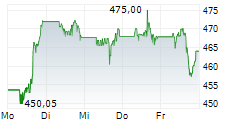
By Vicki Hyman
Mastercard
NORTHAMPTON, MA / ACCESS Newswire / February 4, 2025 / More than 3,000 business and government leaders, academics and artists gathered in the mostly snow-less Swiss Alps for the World Economic Forum's annual summit in Davos under the banner "Collaboration for the Intelligent Age" last week. And while all eyes were on Washington with the U.S. inauguration, the discussions on the ground emphasized the need to drive forward digital transformation - from agentic AI to blockchain to the commercialization of these technologies - that benefits everyone.
"In a day and age where you've got ... a disaggregated world, you want something that protects you," said Jon Huntsman, Mastercard's president of Strategic Growth, at a panel on stemming financial fragmentation. "We have spent a lot of money on consumer protection, on cyber, on tokenization … that allows us to gain critical insights and intelligence on who's got your information, who might be a bad actor, and how to avoid that."
AI remains atop the agenda
Artificial intelligence continued to dominate discussions - both its "stunning technology possibility," in the words of former U.S. Treasury Secretary Larry Summers, and the "epic challenge" it poses for governments all over the world. Leaders discussed a number of those challenges they needed to address, including how they could meet the demands for energy and computer chips that heavy use of AI requires.
Additionally, they'll have to confront a potential "crisis of truth" that AI could exacerbate, as Pope Francis characterized it in a written address, and find ways to upskill employees for the age of AI - even as a WEF survey earlier this month revealed that 41% of employers globally plan to downsize their workforce by 2030 due to AI automation. In fact, Salesforce CEO Marc Benioff said that the chief executives gathered in this Swiss village would be the last generation to manage all-human workforces.
Even as participants discussed the big issues of the day, they didn't lose sight of the little things that are foundational to digital alignment and collaboration. Described by one participant as "inspired dullness," a continued drive towards common standards came up frequently.
For small businesses, AI could be a gamechanger, but panelists acknowledged there are challenges in bringing those benefits to resource-strapped entrepreneurs. "There's mistrust around technology. There's time poverty. There's a sense of overload in terms of where to start," says Payal Dalal, an executive vice president for global programs at the Mastercard Center for Inclusive Growth, at a panel hosted by the Center on driving resilience for small businesses in an AI-driven world.
"And finally," she continued, "small businesses don't know how AI can really help them save time and make money. So really understanding what the needs of the small businesses are and then figuring out how AI can help as opposed to just pushing AI towards small businesses is the way forward."
And in a piece for the WEF Agenda blog published as the summit opened, Ling Hai, Mastercard's president for Asia Pacific, Europe, Middle East and Africa, highlighted how partnerships across the public sector, nonprofit and private sector are essential to accelerating the digital journeys of small businesses, which can boost economies and drive greater inclusion and resilience.
Trust must be foundational
In addition to AI, the rise of cybersecurity risks was a major topic of discussion at WEF this year. As attacks are growing in scope and scale, small businesses need help, Ling Hai wrote. "Given the pressures of running a small business, it is impossible to expect owners to keep track of the latest updates or research the best network monitoring software, but trust with customers that has taken years to build can be shattered in seconds by a cybersecurity breach."
A new report by WEF released earlier in January on the state of cybersecurity pointed to the growing complexity of cyberspace, which is widening the opportunity gap between large and small organizations, and deepening the economic divide between developed and emerging economies.
Collaborative action, particularly between the private and public sector, is needed to ensure "we can bring innovation and data in the context of AI along, so that we can ensure that the Global South is well protected for future generations," said Kiki Del Valle, Mastercard division president for North Latin America at a panel convened by ODI and Mastercard on leadership in an era of weakened multilateralism.
Another worrying finding of the survey: About 35% of small organizations believe their cyber resilience is inadequate, a proportion that has increased sevenfold since 2022. Meanwhile, many more large organizations are reporting that they believe they have enough cyber protections.
"Safety and security, right now, is one of the biggest threats that face us globally," said Linda Kirkpatrick, Mastercard's Americas president, who joined a panel on the WEF mainstage on the future of the economy in Latin America and the Caribbean.
"One positive outcome of the pandemic was that our small businesses, our consumers, got comfortable in a digitized environment," she said. "We want everyone to have access, and we want access to drive usage. At the same time, that advancement in digitization can lead to risk in the system in the form of cyberattacks. Safety and security, right now, is one of the biggest threats that face us globally. We need to unify around a common goal to protect our digital ecosystem."
Originally published by Mastercard
Follow along Mastercard's journey to connect and power an inclusive, digital economy that benefits everyone, everywhere.

View additional multimedia and more ESG storytelling from Mastercard on 3blmedia.com.
Contact Info:
Spokesperson: Mastercard
Website: https://www.3blmedia.com/profiles/mastercard
Email: info@3blmedia.com
SOURCE: Mastercard
View the original press release on ACCESS Newswire



